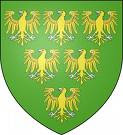This post has been inspired by a recent post on Kathryn Warner’s excellent Edward II blog. It concerns the knighting of Edward Ist’s son, Edward of Caernarfon, the future Edward II, at Westminster on Sunday 22 May 1306. Kathryn says the event was ‘described by the contemporary chronicler Piers Langtoft as the greatest event in Britain since King Arthur was crowned at Caerleon.’. Here’s a link to Kathryn’s post on the subject –
http://edwardthesecond.blogspot.com/2011/05/knighting-of-22-may-1306.htmlKathryn brought to my attention the fact that Piers Gaveston was not knighted at the ceremony, but a few days later, and the fact that he was the only one of the group to be knighted at a separate ceremony. The only logical reason for this was that he must have been ill, and that the illness must have been de-habilitating enough to prevent him from attending the ceremony. What has sparked the interest of Kathryn and I is the nature of the illness, and the fact that Piers’ illnesses have been worthy of being recorded in documents.
An anonymous letter written in April 1311 records the fact that Piers was ill at that time - "A secret illness troubles him [Piers] much, compelling him to take short journeys." Almost an exact year later, Edward II is recorded as paying William de Burntoft, a doctor, and Brother Robert de Bermingham, a monk from Tynemouth, 10 marks each for caring for Piers in yet another bout of illness. Why was Piers’ illness in 1311 described as ‘secret’, and was it serious enough to strike again a year later? And what could it be that only allowed him to make short journeys?
My ‘ideal’ of Piers Gaveston, judging on what the chroniclers of the time recorded, is as someone strong and athletic. He was seen as the ideal role model for Edward II when he was a prince. It was hoped his good manners, grace and chivalric attitude would guide the prince. There are references to Piers being at war at the age of possibly 14 or 15, and attending tournaments. One report says he earned the ire of Edward Ist by abandoning the campaign in Scotland to attend lucrative tournaments elsewhere. There is an excellent description of Piers at the coronation of Edward II and Isabella by the Pauline annalist. Piers is described as "so decked out that he more resembled the god Mars than an ordinary mortal". His clothes might have been dazzling, but there is no doubt that Piers’ physical features added to this description of him as the God Mars. The tournament held by Piers at Wallingford in 1307 further enhances his reputation as strong and athletic, as we are told how he defeated and humiliated various nobles. Piers also married Margaret de Clare in 1307, and was able to consummate the marriage and father a child – Joan.
For me, all this information is at odds with someone who was prone to illness, and possibly a recurring ’secret’ illness at that. Perhaps Piers was merely unlucky with his illnesses, which could possibly all be different and not connectedl. But why use the word ‘secret’? ‘Secret’ suggests the illness may have been out of the ordinary, embarrassing or something that could be interpreted in a sinister way. Gabriele, on Kathryn’s blog, put forward Crohn’s disease or possibly malaria. Both cold be probable. Crohn’s might certainly have caused Piers some embarrassment, but not malaria. I did wonder if the illness might be something like epilepsy, which might possibly have been viewed as superstitious. However, this might strike at anytime and would be something Piers had no control over, and if he suffered an epileptic seizure, it might have occurred more frequently than his documented illness and something that he would have found very difficult to hide from others. It also begs the question how would anyone treat him for this? Hmm, I dread to think! Pus, whatever Piers suffered with, it took him days to recover from. This doesn’t really fit with epilepsy. The illness must have been so de-habilitating it caused the chaotic flight from Newcastle. The illness must have been so serious that Piers, and therefore Edward, could not flee to safety. This suggests to me that Piers would not have been able to move, or be moved. It might have been possible to move Piers if he had some sort of a fever – after all, the nobles were in hot pursuit of him. But if he were in some sort of terrible pain, Edward must have felt that he dare not move him. Another explanation for not moving Piers is that it was life-threatening. And yet, after treatment, Edward and Piers were able to flee, and Piers was prepared for a siege at Scarborough Castle, and Edward was not worried about Piers’ health to leave him there.
Another reason for the secretive nature of the illness might have been that it would give the enemies of Piers’ hope, in that his illness would soon carry him off. But then Edward and Piers were preparing for a siege at Scarborough, so whatever it was he recovered quickly was it was not deemed life-threatening. Perhaps it was something that caused Piers’ embarrassment – and if he was as vain and proud as we are led to believe, he would surely hate anyone to know that he had 1. a weakness and 2. an illness which would be mocked by others, especially his enemies. We will probably never know, but it is something certainly worth speculating about.
Having mentioned Kathryn's post here, I'd like to take the opportunity to congratulate her on receiving a publication date from EHR for her excellent article on The Earl of Kent's plot, which I have been fortunate enough to read.



